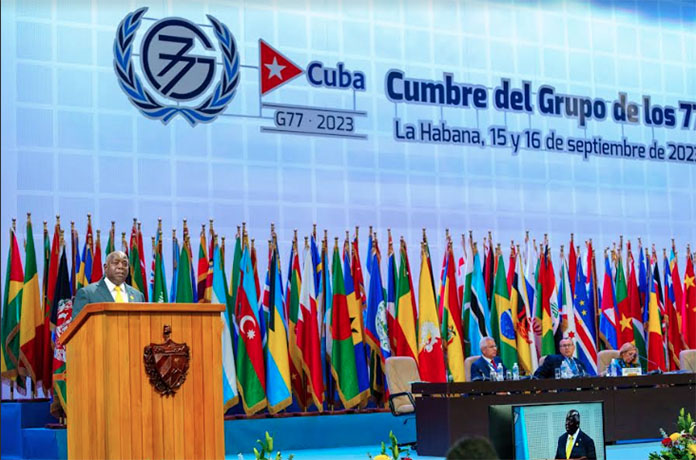
Conference Chair
Ladies and Gentlemen:
To the people and government of the Republic of Cuba,
I extend my sincere gratitude for hosting this event. Your hospitality and commitment to South-South partnership and dialogue are genuinely appreciated.
Today, we stand at the crossroads of development where science, technology, and innovation (STI) have the potential to significantly accelerate our 2030 development agenda. We recognize the transformative potential of STI, including efforts to bridge the digital divide and foster a culture of digital literacy, and we are embracing this new frontier with vigour and vision. We view scientific knowledge and innovation as the catalysts for driving sustainable development in and between the 700 islands in our archipelagic nation.
Together, we are asserting our sovereignty over scientific knowledge production. We do not need to depend on the Global North. We have created and are expanding networks of South-South scientific research collaboration. Our University of The Bahamas has established networks with fellow universities in the Global South. For example, our University recently signed an agreement with the University of Botswana to partner together on climate change, biodiversity, sustainability, and the rational use of our planet’s natural resources.
Building capacity is at the heart of the right to development. For The Bahamas, as an Ocean state, scientific research capacity building starts with the marine environment and the high seas. The sustainable development of our marine environment requires a tool set that we as policy makers must secure from South-South and North-South technical assistance and capacity building projects. Our political and moral obligation is to ensure that every citizen has the access and ability to benefit from our efforts to do so .
The power of Information and Communication Technology (ICT) for development is immense. And, as I highlighted at the Caribbean Telecommunications Union ICT Week last year, we are committed to harnessing this power for the collective upliftment of our nation and our region.
We are enormously optimistic about new programs which reflect a shared vision of our member nations for a region and a future propelled by innovation and inclusivity.
Colleagues and Friends,
Let me pause and mention the recent visit to my country of the esteemed former Nigerian President, Mr. Obasanjo. His leadership of the G77 has inspired many, and in recent discussions in Nassau, we were inspired by his insights, which have further galvanized our commitment to the causes we deeply believe in.
We are here today because we have projected and maintained “unity amongst diversity”. In our next chapter we must maintain unity, respect ideological diversity, and forge greater solidarity. This is a message that we must carry forward to the next generation of leaders, who will shape the future to come.
We are navigating an age where technology is evolving at a pace unprecedented in human history. However, the speed of these advancements will mean little if they don’t touch and improve every life. That’s where our young minds come in. They don’t just adapt to change; they drive it. And as stewards of our nations, our role is to ensure that they are fully equipped, educated, and empowered to harness the benefits of technological advances.
Consider Artificial Intelligence, a tool with the potential to transform our approaches to some of the world’s most pressing issues. Whether it’s predicting climate patterns, managing resources more efficiently, or addressing health crises, AI will be involved in building solutions. But it’s imperative that our young people not only utilize these tools but have a pivotal role in defining their ethical and practical frameworks.
Climate change underscores the urgency of this collaboration. This isn’t just one of many concerns; the warming climate threatens our existence. Our actions today will dictate whether our planet will be habitable for humanity. Technology, in the right hands, can be harnessed to lead to cleaner energy, sustainable urban development, and a holistic approach to preserving our planet.
As we’ve learned all too well in recent times, health threats don’t recognize borders. Addressing and preempting global health challenges requires not just the best of our science but also the fresh, dynamic perspectives of our younger generation across our regions. Their agility and depth of knowledge can set us on a path to proactive rather than reactive solutions.
Before I close I want to invite the G77 to support the movement afoot at the United Nations that supports the United Nations as a More Inclusive and Effective Body for International Tax Cooperation & Administration. The United Nations is the appropriate body to design and build a truly equitable and inclusive international tax administration architecture with equal footed representation, an environment of one country, one vote. For too long we have all lived in an environment where global tax policy was mandated and designed by the OECD where concepts underpinning the current international tax system prefer the interests of the Global North, that is, OECD members and developed countries, at the expense of small developing countries, primarily black governed former colonies in the Global South, former colonies of those same members of the OECD.
The arbitrary and discriminatory actions of the OECD and EU have disproportionately affected countries of the Global South, already reeling from actions and impacts of countries from the Global North. The climate crisis is largely created by industrialised countries, many in the Global North. The effect of the climate crisis is felt disproportionately by small developing countries like The Bahamas. This is exacerbated by the arbitrary blacklisting of these same vulnerable countries such as The Bahamas from the very same countries that are responsible for the Climate Crisis. For example, when it comes to insurance, these blacklists result in any remittances from European reinsurers on claims being automatically reduced by at least 25%. A significant percentage of the monies owed is punitively retained by the EU. We are thus poorer and less able to rebuild because of the effects of the Climate Crisis. We demand equal treatment, we demand the UN be the proper arbiter in tax matters, we demand privileged multilateral organizations like the OECD take your knee off the proverbial necks off countries like The Bahamas, countries of the Global South.
So, the way forward for the G77 is clear: It’s a path paved with technology, driven by the ambitions and aspirations of our youth, and steered by the collective wisdom of our nations. The G77 also must make a stand in support of equality among countries and governance at appropriate forums such as the UN, an environment where developing countries in the Global South have the same policy impact globally as developed countries of the Global North.
By championing their involvement and ensuring they are at the forefront of decision-making, we are not just investing in our future but ensuring a trajectory of progress, unity, and solidarity.







